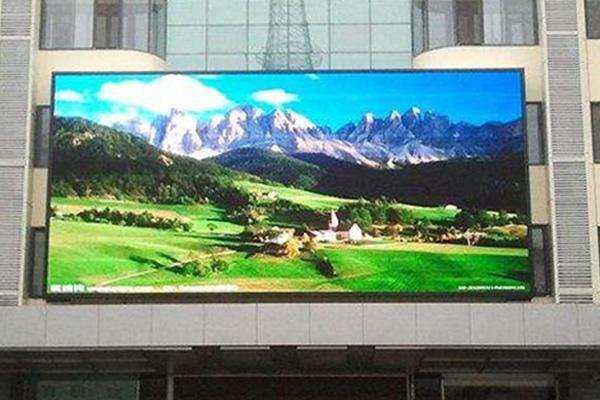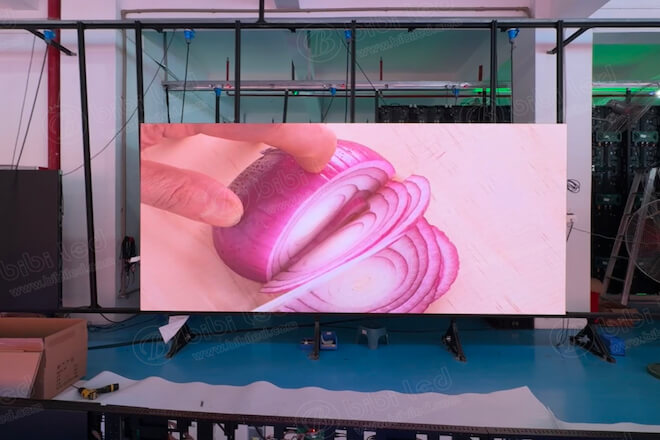Introduction

In the bustling scene of the city, outdoor LED screens have become an important tool for conveying information and advertising. They not only light up the night sky of the city but also become part of the modern urban landscape.
However, if installed and used without consideration, these screens may be out of tune with the surrounding environment and even destroy the beauty of the city.
This article will provide you with 4 practical tips to help you harmoniously integrate outdoor LED screens with the urban environment, making them not only a medium for information dissemination but also a color enhancer of urban aesthetics.
Tip 1: Choose a suitable installation location for the LED screen

Choosing a suitable installation location is crucial to the success of the LED screen. It is not only related to the effective communication of advertising information but also directly affects the harmonious coexistence of the screen and the urban environment.
A proper location can maximize the visual effect of the screen while reducing interference with the urban landscape, making it a part of the urban landscape rather than an abrupt existence.
1). Provide tips:
- Sight angle:
Make sure that the installation location of the display screen can provide a good sight angle so that the audience can clearly see the screen content when standing or walking naturally.
This includes considering the height, tilt angle of the display screen, and the obstruction of surrounding buildings. Through a reasonable layout, the display screen should have a visual focus rather than requiring effort to find or adjust the sight to see.
- Consider the flow of people:
First, analyze the distribution of potential audiences. Choosing to install display screens in areas with high traffic volume and dense target audiences, such as commercial blocks, transportation hubs, tourist attractions, etc., can ensure that advertising information is seen by more people. At the same time, avoid installing in places with few pedestrians or inconvenient transportation to avoid wasting resources.
- Surrounding architectural style:
When choosing the installation location, fully consider the style and color matching of the surrounding buildings. Try to choose a location that is coordinated with the surrounding environment so that the display screen can be visually integrated into the urban landscape and reduce the sense of abruptness.
For example, in a modern commercial district, you can choose a simple and fashionable display screen design, while in a historic district, you can choose a more low-key display screen that matches the style of ancient buildings.
2). Example:
Take the historical and cultural district of a certain city as an example. The area is famous for its quaint buildings and tranquil atmosphere. In order to promote a cultural event in the area, the organizers planned to install an LED display at the entrance of the block.
After careful investigation, they chose a location that would attract tourists’ attention without destroying the atmosphere of the block: in the open area at the entrance of the block, next to a representative ancient building, but at a certain distance to avoid obstruction.
The display screen adopts a color tone and a simple design style that is coordinated with the ancient building. Taking into account the flow of people and the angle of sight, the display screen is installed on a slightly elevated platform to ensure that tourists can naturally see the screen content when entering the block.
Through such a location selection, the display screen not only successfully conveys information about the cultural event but also becomes a beautiful landscape of the block, coexisting harmoniously with the surrounding environment.
Tip 2: Customize the LED display screen to coordinate with the city’s appearance
In today’s rapid urbanization, LED display screens are an important medium for urban information dissemination. Their appearance design is not only related to advertising effects but also directly affects the overall beauty of the city’s appearance.
An LED display screen that is coordinated with the city’s appearance can integrate into the surrounding environment, reduce visual conflicts, enhance the city’s image, and become part of the city’s landscape.
Therefore, it is particularly important to customize the appearance design of the display screen to coordinate with the city’s appearance.
2). Practical tips:
- Color matching:
When choosing the color of the display, you can look at the color of the buildings or natural landscapes next to it. Then, try to make the color of the display similar or matching with these environmental elements.
For example, if the display is installed next to a green park, it may be better to choose light green or natural colors.
- Shape and size:
The shape and size of the display are also important. It should not be too big or too small, nor should it have a strange shape, but should look like part of the surrounding environment.
For example, on a busy commercial street, a medium-sized, square display may be suitable.

2). Example:
Imagine a square in the center of the city, surrounded by buildings of various styles. To celebrate the festival, an LED display is installed in the square. This display uses a color similar to the surrounding buildings and is of moderate size, not taking up too much space.
What’s more special is that the border of the display is designed to be the outline of the city’s iconic buildings, such as a famous clock tower or tower.
When playing the festival celebration pictures, these design elements not only make the display screen more attractive but also blend into the entire urban environment, becoming a beautiful landscape on the square.
Tip 3: Content creativity and cultural integration of LED display screens

If you want to make the LED display screen more attractive, the content must have some “material” and be closely connected with our lives and culture. In this way, everyone will not only find it interesting but also learn something.
1). How to do it:
- Tell our story:
Don’t always put advertisements on the display screen, but also tell the story of our city. For example, today is the Dragon Boat Festival, so put a video of the dragon boat race to let everyone feel the festive atmosphere.
In this way, the display screen is like a talking “tour guide” to take everyone to understand the city culture.
- Full of creativity:
The content must be a little innovative, not always the same old thing. You can use animations, small games, etc., to make the display screen “move.”
For example, do a small quiz about environmental protection knowledge, and there will be rewards for the correct answers. In this way, everyone can learn something while watching, how interesting!
- Keep up with current hot topics:
The content on the display screen must be fresh and keep up with the times. For example, if there is an important sports event recently, put the exciting moments of the game and let everyone cheer for the hometown team together.
In this way, the display screen becomes a “small window” for everyone to get information.
2). Benefits:
In this way, the LED display screen is no longer a cold billboard. It becomes warm and emotional and closely connected with our lives.
Everyone not only finds it pleasing to the eye but also gains knowledge and receives education in a relaxed and pleasant atmosphere. Who doesn’t like such a display screen?
Tip 4: LED display screen using environmental protection and energy-saving technology

1). The importance of environmental protection and energy-saving technology:
With the advancement of urbanization, environmental protection, and energy conservation have become issues that we cannot ignore. As a highlight in the city, the energy consumption and environmental protection performance of LED display screens have also attracted much attention.
LED display screens using environmental protection and energy-saving technology can not only reduce energy consumption and reduce the impact on the environment but also contribute to the sustainable development of the city.
2). Application of environmental protection and energy-saving technology:
- Intelligent brightness adjustment system:
To further save energy, we can equip the LED display with an intelligent brightness adjustment system. This system can automatically adjust the brightness of the display according to the intensity of the ambient light, avoiding over-illumination when the light is sufficient, thereby saving energy.
At the same time, it can also optimize the display effect according to the viewing distance and angle to enhance the viewing experience.
- Choose low-energy LED display screens:
When purchasing LED display screens, we should give priority to those with low energy consumption and high efficiency.
These display screens use advanced LED chips and circuit designs, which can significantly reduce energy consumption while ensuring display effects.
- Reduce light pollution:
Light pollution is an important issue in urban environments. In order to reduce the light pollution caused by LED displays to the surrounding environment, we can adopt anti-glare design, adjust the light angle and other measures.
In addition, reasonable control of the opening time and brightness of the display is also an effective means to reduce light pollution.
Conclusion
Through the introduction of the above 4 tips, we know that the installation and use of outdoor LED displays is not only a technical issue but also a manifestation of art and environmental aesthetics.
Proper planning and management of your LED display can significantly improve its harmony with the urban environment, reduce interference with residents’ lives, and enhance advertising effects and urban image.
Finally, if you want to learn more about LED displays, please get in touch with us.


